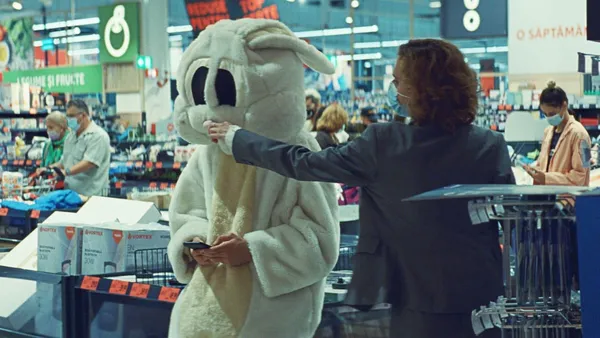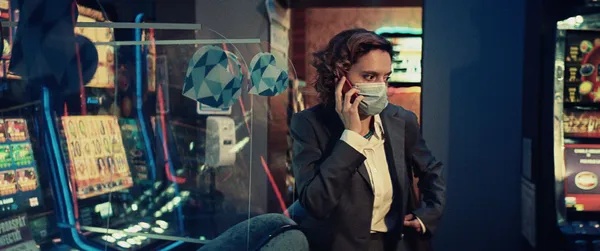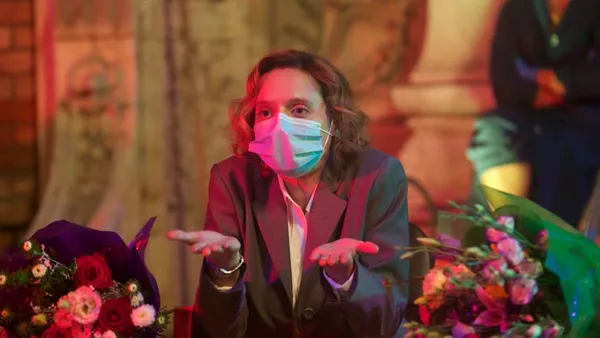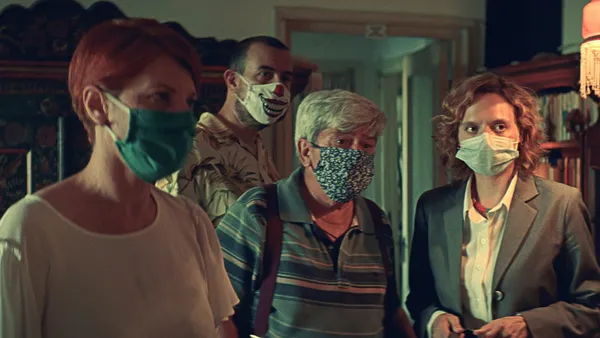 |
| L is for Language - A translation of Bad Luck Banging will miss how uncensored is the language the characters use |
Radu Jude’s challenging Bad Luck Banging Or Loony Porn is in many ways a universal film. The Golden Bear from Berlin confirms that. It is a deep-cut anatomy of today’s anxieties and rampant bigotry, of the lack of empathy and hypocrisy that have plagued the entire globe. Yet, equally, it is so rooted in Romanian culture and so ambitious that I cannot help but wonder if there are not some things that could get lost in translation and that a non-Romanian audience might miss.
So, should you have found yourself confused by Jude’s tour de force, worry no more. Let us take on an in-depth tour through some particularities of the film and let us find out what exactly Jude intends to critique. As a disclaimer, I do have to stress that I sympathise with most of the director’s opinions here and subscribe to his critique of Romanian society. Therefore, by no means does this text aspire to be impartial.
Axinte
What is easy to miss for a non-Romanian audience is that Jude’s gathering of self-contradicting parents acting as a simulacrum for modern society makes use of many instantly recognisable faces. Most of the parents are played by left-leaning and progressive actors and personalities, used, subversively and ironically, against their real-life convictions. Equally, Alexandru Potocean’s character seems like a self-aware interpretation of how most of the educated left often sound. There are some small industry jokes as well, such as the presence of producer Ada Solomon (whom we also see earlier in a fur coat) and the film contains many of Jude’s long-time collaborators. Everyone plays themselves as much as they play the characters. Aside from some archetypal takes on the modern parent, Jude employs some characters from popular media and culture. Such is Axinte, the funny looking hat man, one character lifted from a problematic comedy show from recent TV history. He doesn’t get introduced, but it is very clear who he is – think as if it was, let’s say, a profoundly problematic Mr Bean appearing on screen.
Babardeală
Part of the original Romanian title. Means Banging. Yet Banging does not have enough of the scandalising faux-pas, shock value of the original word, nor its humoristic implications.
Bertolt Brecht
You cannot talk about Jude’s most recent projects without talking about Brecht. It is a self-confessed influence and interest; Brecht even appears on the credits of Bad Luck Banging. Although it may be a more evident reference in I Do Not Care If We Go Down in History As Barbarians (2019), for example, the Dictionary segment in Banging is definitely a Brechtian device as well.
Bucharest
Bad Luck Banging takes place in an also instantly recognisable Bucharest, feeling like a half ode, half lamentation to the city. Without specifying, your Romanian spectator will know whereabouts in the capital the main character Emilia is. It is not the Bucharest as represented by its landmarks – although we do get a few of them in the Dictionary segment – but the city as we pass by it in our daily lives, dirty, absurd, and sometimes poetic. Jude crafts a brilliant piece of observational cinema about a patchy city that seems eternally in construction, filled with bizarre occurrences and flooded by the wonky aesthetics of late capitalism – billboards, ridiculous adverts, shop signs. This along with the remains of the communist era, abandoned factories, iconic buildings, bind together into an eclectic and at times surreal Bucharest, in the film as in real life. Jude’s commentary on nationalism, history, consumer culture and lack of empathy seem to be imbued in the architectural landscape of the city.
Ceaușescu
Jude’s entry on former dictator Nicolae Ceaușescu is rather economical and factual – which in Romanian society and popular discourse it hardly ever is.
Children
Jude’s entry on Children makes use of footage from a school ceremony where they’re singing a very popular patriotic song. While it may not seem like a strange or condemnable occurrence per se, Romanian schools tend to put on very exalted and celebratory shows, and often talk about national pride - perhaps some residue we cannot shake off from the youth parades that used to happen during Communism. They are often very superficial and the mise en scène of over-ambitious teachers, the children never understanding much of what is happening. Some of them are mind-bogglingly problematic - take, for example, the later entry in the Dictionary where there’s an executioner pretending to cut the head off a child cast as, I would guess, Constantin Brâncoveanu (a ruler whose story goes that he refused to renounce Christianity before the Ottomans).
See Education, Institution of
Conspiracy
I do not suppose this is unlike elsewhere, but conspiracy theories are very much on the menu in today’s Romanian society. The willingness of some to believe idiotic things as long as they offer self-validation and uphold national(istic) values is something that Jude observes and calls out. They are generally theories that claim the Romanians are the poor victims of a historical scheme that refuses to rightfully acknowledge us and our achievements. As conspiracy goes, we have been the first at presumably everything and Europe, if not the world, would not be where it is, if it weren’t for us. We are the God sent children.
See Dacians, (the)
Jude himself has been accused by some Romanians of having a certain type of agenda - the name is telling! and J(ew)de is the joke. He is supposedly financed by ‘the Jews who will take over the world’- a conspiracy he obviously makes fun of in Bad Luck Banging. The fact that he won the Golden Bear in Berlin fits perfectly with this conspiracy.
Culture
Jude’s entry on Culture features a video of Paul Dunca/Paula Dunker, one of the most interesting queer activists and performers in Romania, and equally a recognisable face of the art scene in Bucharest. They are also present as one of the parents at the meeting. The context here is that Romania is extremely reticent towards contemporary art and a very conservative public has put out a concerning amount of hate-speech towards queer artists.
Dacians, (the)
The supreme race you have never heard of. Kind of like the Vikings, that’s the hope. Historically speaking, an interesting people that lived 2000+ years ago around these parts, but who have been exaggerated into a central theme of nationalistic discourse. Among many other historical figures, they are insisted on as national heroes. You can see the references to them in the wolves graffiti that the camera lingers over and in the nuns’ song.
Education, Institution of
See School, probably.
Eminescu
Just as Jude says, Eminescu is the publicly aggrandised national poet. He has written pornographic text – like many others – and we choose to forget that, because porn=bad. He has also written anti-Semitic texts, and we also choose to forget that.
 |
| E is for Essay - Jude’s type of reflexive cinema is rather uncommon for Romanian Cinema. |
Essay
Jude’s type of reflexive cinema is rather uncommon for Romanian Cinema. Authors like Cristi Puiu and Corneliu Porumboiu have also dabbled in reflexivity and have applied theoretical frameworks to their films, but Jude is embracing an even more theoretical, essay-like approach, one that challenges much of what a film is supposed to traditionally be. In doing so, Jude feels very synchronous with the greater interests of modern cinema. What is and what isn’t cinema? The lines have blurred, and Jude is there to take advantage of it. The sex-tape from Bad Luck Banging also subscribes to larger questions about the nature of the audiovisual nowadays, in terms of private vs. public, but also in terms of the democratisation of the act of filming.
Fascism
We do not choose to forget certain Romanian leaders, such as Ion Antonescu, but we choose to forget the atrocities they have committed and Romania’s participation in the Holocaust. See Jude’s I Do Not Care If We Go Down in History as Barbarians. For Communism, see Jude’s Uppercase Print (2020).
Gabriel Spahiu
One of Jude’s favourite and oldest collaborators. Perhaps one of the greatest Romanian actors today and an important figure of the Romanian New Wave. The film stops on a freeze-frame of him getting choked by a dildo.
Girl from Page 5, (the)
The context for this is that women themselves could send pictures to the newspaper - similar to the idea of “readers’ wives” in the UK, and that it was one of the most accessible daily journals. The larger context, and relating to the questions Bad Luck Banging asks about obscenity, is that these women were made fun of as much as they were seen as well-deserved visual pleasure for the male readers.
Hollywood
Not unlike elsewhere, the large audience has become accustomed to a certain monopoly of the mall cinema, where it is mostly commercial films that are playing. Hence, the most common complaint the Romanian film industry hears is, ‘Why can’t we make films like they make in Hollywood?’ and local cinema (see the Romanian New Wave) has been disregarded for being too ‘boring’ and depressing. Jude’s third ending for Bad Luck Banging provides exactly what the Romanian audience has been asking for: a Hollywood, super-hero type of ending.
House of the People A megalomaniac structure built during Communism. Currently where the Parliament resides. An actively hated Bucharestian landmark, yet equally what we take pride in for being one of the largest man-made constructions in the world. Probably the most popular tourist attraction. Like many other communist super-buildings, also the site of many tragedies (aside from modern-day politics).
Jews, (the)
Jude has made a series of films that touch on Jewish identity (Scarred Hearts, 2016) and on the unjust (and genocidal) treatment of the Jewish by the Romanians. See also The Exit Of The Trains (2020), The Dead Nation (2017), I Do Not Care If We Go Down in History as Barbarians. The topic of anti-Semitism in Romania often gets brushed under the carpet, which makes Jude’s work not only challenging but also necessary.
Language
A translation of Bad Luck Banging will miss how uncensored is the language the characters use. It is full of profanities, some very visceral and creative, some humorous, but very much natural, lifted exactly from real life. Although the New Wave has previously inserted some swear words into Romanian Cinema, nothing quite compares to how unfiltered they seem in Jude’s film and to an audience who have not been accustomed to this level of freedom, it will still feel like a very scandalous – if not in poor taste – thing to do.
It is to be noted that the hate-fuelled parents also use slurs in how they speak. Emilia does not.
Mythologies
Jude borrows much from Romanian popular culture throughout the film, from TV personalities to specific politicians, to music, to practices; an amount of them are problematic. It is hard to explain them all, but Bad Luck Banging feels like a compendium of modern Romanian mythologies.
 |
| N is for New Wave, (the) Romanian - Not what Jude is doing any more. |
New Wave, (the) Romanian
Not what Jude is doing any more.
Obscenity
The Romanian public pretends they don’t like to see naked people on screen. Like any conservative audience in general, popular opinion doesn’t seem to be able (or want) to distinguish between nudity on film and pornography, and there is a certain expectation that any filmed sexual act is automatically obscene. I have said before that if there is anything that I find obscene it is not the unapologetic sex tape in Bad Luck Banging, but the hypocrisy of Romanian society; we have a problem with two people having sex in front of the camera (and in a film), but the misogynistic jokes, adverts with sexual connotations and exploitative media and tabloids seem to be just fine.
Here it must be mentioned that the Romanian public also found fellow Golden-Bear winner Touch Me Not (2018, Adina Pintilie) obscene and in poor taste, and were scandalised by it even more than by Bad Luck Banging.
Ever since Aferim! (2015), what your angry Internet mob has raised their pitchforks at Jude for has been ‘obscenity’ and ‘profanity’, they have shouted at him for being ‘too intellectual’ and for attacking cardinal and untouchable values of Romanian society. At times, because he confronts Romania with uncomfortable parts of its past, he has been accused of even falsifying history. Judging by what the angry parents at the meeting have to say in Bad Luck Banging, these types of negative comments function almost as source material for the film.
Pandemic
The film features references to events and scandals at the beginning of the pandemic. It’s your general anti-mask sentiments and protests, but there are particular ones such as debates about whether the Church should abide by the restrictions. There are some mentions, for example, to a certain situation where the virus might have been spread via spoons during communion. In Romania, The Church has been one of the main actors spreading misinformation regarding the virus – on the basis that God is the only protection anyone needs.
Parking Spaces
Sure, your capital city might be crowded, but Bucharest has its own brand of traffic and parking space crisis. Where drivers park is often the source of many (violent) conflicts. Drivers also usually feel very entitled, as you can see in Bad Luck Banging when a man casually hits another with his car. Bucharest is filled with many of these stranger than fiction type of moments.
Pork
Traumatising visuals of meat are part of Romanian culture, especially around Christmas, when we encourage children to take part in cutting pigs for Christmas dinner.
Racism
Aside from discrimination against the Jewish, Romanian society has been discriminatory towards the Roma people as well, to the point of enslaving them in the past. That is another subject that is rarely talked about and that Jude approaches in Aferim!. Discrimination against the Roma people is still rampant in today’s society (see the slurs the parents use at the meetings) and see the short video in the Dictionary of a driver refusing to let a Roma woman get on the bus.
Of course, there is also discrimination happening against the Romanians, and especially in the West of Europe. The short video for the Salary entry hints to how many Romanians who work abroad are often exploited by companies – because they do not know the language and especially if they are unskilled workers – and spoken to as if they were not really people.
 |
| S is for Schools - Reputation is important and if anything tarnishes the school’s pedigree, hell will break loose |
Romanian Army, (the)
Jude explains how the army has done questionable things, but what is to be mentioned is that the shot he uses in the dictionary comes from the military parade on the National Day. It is the place to be on the 1st of December and it has become somewhat traditional, and nobody has ever questioned it. Yet Jude seems to point out that such a celebration of the armed forces is a bit concerning.
The Romanian Army is something that often slips into conversation with certain (‘old-fashioned’) people and they will get defensive should it be in any way insulted.
Romanian Orthodox Church, (the)
Jude shows a shot of a golden roofed building, the infamous People’s Salvation Cathedral – a megalomaniac structure that has been built in the middle of Bucharest. It cost a lot, it hasn’t been finished and the Church is still capitalising on churchgoers for it. It is the source of many debates regarding the necessity of keeping Church and State separate, something which doesn’t always happen.
The Romanian Orthodox Church also has a past with fascism, being extremely tied with the Legionnaires in the 20s-40s. Over-nationalistic, homophobic, xenophobic, Romania-first type of sentiments also usually happen to sympathise with the Church. You can get an example of that in the song the nuns sing to the priest – a song which calls upon the language that was often used in the Legionnaire discourse. The Church is a very supposedly quiet-but-everywhere presence in Romania, as you can see from the random Jesuses and icons throughout the film.
Schools
There is a certain type of school management that the one in Bad Luck Banging seems to adhere to. It is something that happens with some schools in the bigger cities, where headmasters will do anything for prestige and act as if their public schools were private schools. Reputation is important and if anything tarnishes the school’s pedigree, hell will break loose. Schools in the cities are often gentrified, in the sense that the wealthier students often have advantages or are seen as more ‘proper’, and wealthier parents are often the ones that need to be kept happy.
You will also notice in Bad Luck Banging that the headmistress is rather despotic towards the cleaning lady. The subtle detail is that the cleaning lady is played by ethnically Roma actor-director Alina Șerban. Because employment is often discriminatory, it is not uncommon for Roma women to have to take up cleaning jobs in schools - and they are often mistreated by the higher-ups and the students alike.
Sex Education
Not something that is taught in schools. The past years have seen many protests against the introduction of sexual education in schools, for the ‘fear that it will turn our poor, innocent children dirty’. The parents at the meeting seem to be case in point for that discussion.
Teacher, Porno (the)
Jude’s film is based on a few real life situations where (female) teachers have found themselves in similar ordeals. The press and the Internet have unempathetically dubbed them The Porno Teachers and have treated them miserably. They were ridiculed, blamed, slut-shamed and never allowed to stand up for themselves; if I remember well, most of them were also fired as a result. Jude’s Emilia seems like a collective defendant at their trial.
Xanax
Look, I am not sure if this is actually a reference* – I would love for it to be so – but the scene with Emilia at the pharmacy calls upon a very similar one in Cristi Puiu’s Aurora (2010), where the main character also asks for a single Xanax.
*Jude has since let me know it absolutely isn't one.
War
Jude’s entry on war comments on the widespread often nostalgic obsession with the World Wars. In Romanian society, war is often seen through fascinated eyes and the atrocities committed by the Romanians during and around the time of the World Wars are very rarely mentioned.
Bad Luck Banging Or Loony Porn is now in UK cinemas.





















